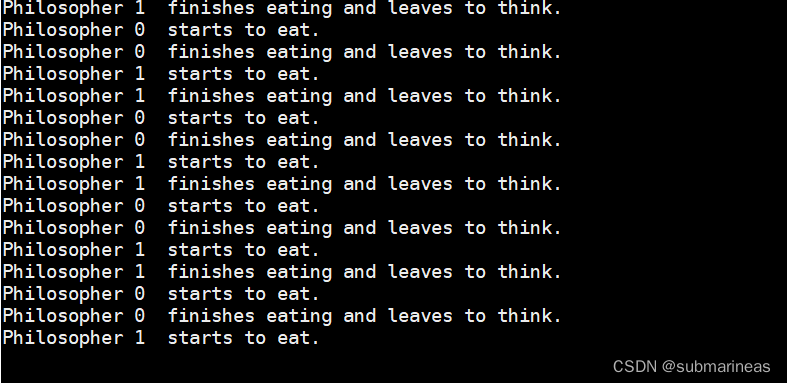引言
本篇是之前复习完哲学家就餐问题后,最近又回过头去感觉可以整理下思路,又在实验楼找到了python相关实验,故想在这里总结一下当前问题的方案。
问题描述
一张圆桌上坐着5名哲学家,每两个哲学家之间的桌上摆一根筷子,桌子的中间是一碗米饭。哲学家们倾注毕生的精力用于思考和进餐,哲学家在思考时,并不影响他人。只有当哲学家饥饿时,才试图拿起左、右两根筷子(一根一根地拿起)。如果筷子已在他人手上,则需等待。饥饿的哲学家只有同时拿起两根筷子才可以开始进餐,当进餐完毕后,放下筷子继续思考。

问题分析
系统中有5个哲学家进程,5位哲学家与左右邻居对其中间筷子的访问是互斥关系。即每个哲学家进程需要同时持有两个临界资源才能开始吃饭。该问题只会出现三种情况:
- 每个大哲都拿着左手边的的叉子,等着右手边有叉子好吃火锅
- 每个大哲都拿着右手边的的叉子,等着左手边有叉子好吃火锅
- 有人做适当牺牲,先让别人进行吃饭,吃完再轮到自己
那这里情况1与情况2被称作死锁(deadlock),指当两个以上的运算单元,双方都在等待对方停止运行,以获取系统资源,但是没有一方提前退出时的状况。
情况3是死锁的变种——活锁(livelock),活锁与死锁类似,都是需要获取对方的资源而等待导致停滞不前,唯一的区别是,察觉到停滞不前时会先释放自己的资源,过一段时间再进行获取资源的尝试,但如果双方的操作同步了的话,仍然会导致停滞不前的情况。
这个过程我们可以通过python代码模拟为:
#-*- coding:utf-8 -*-
import threading
from time import sleep
import os, random
#设置为2更容易重现死锁
numPhilosophers = numForks = 2
class Philosopher(threading.Thread):
def __init__(self, index):
threading.Thread.__init__(self)
self.index = index
self.leftFork = forks[self.index]
self.rightFork = forks[(self.index + 1) % numForks]
def run(self):
while True:
self.leftFork.pickup()
self.rightFork.pickup()
self.dining()
self.leftFork.putdown()
self.rightFork.putdown()
self.thinking()
def dining(self):
print("Philosopher", self.index, " starts to eat.")
sleep(random.uniform(1,3)/1000)
print("Philosopher", self.index, " finishes eating and leaves to think.")
def thinking(self):
sleep(random.uniform(1,3)/1000)
class Fork():
def __init__(self, index):
self.index = index
self._lock = threading.Lock()
def pickup(self):
self._lock.acquire()
def putdown(self):
self._lock.release()
if __name__ == '__main__':
#创建叉子与哲学家实例
forks = [Fork(idx) for idx in range(numForks)]
philosophers = [Philosopher(idx) for idx in range(numPhilosophers)]
#开启所有的哲学家线程
for philosopher in philosophers:
philosopher.start()
# 方便 CTRL + C 退出程序
try:
while True: sleep(0.1)
except Exception as e:
raise e
事件截图为:

问题解法
服务生解法
引入一个餐厅服务生,哲学家必须经过他的允许才能拿起餐叉。服务生要保证桌子上始终有一只及以上的餐叉。
其实也就是OS中的信号量设置。定义互斥信号量数组chopstick[5]={1,1,1,1,1} 用于实现对5个筷子的互斥访问。并对哲学家按0~4编号,哲学家 i 左边的筷子编号为 i,右边的筷子编号为 (i+1)%5。
伪码为:
semaphore chopstick[5]={
1,1,1,1,1};
semaphore mutex = 1; //互斥地取筷子
Pi (){
//i号哲学家的进程
while(1){
P(mutex);
P(chopstick[i]); //拿左
P(chopstick[(i+1)%5]); //拿右
V(mutex);
吃饭…
V(chopstick[i]); //放左
V(chopstick[(i+1)%5]); //放右
思考…
}
}
python的代码为:
# -*- coding:utf-8 -*-
import threading
from time import sleep
import os, random
numPhilosophers = numForks = 5
class Philosopher(threading.Thread):
def __init__(self, index):
threading.Thread.__init__(self)
self.index = index
self.leftFork = forks[self.index]
self.rightFork = forks[(self.index + 1) % numForks]
def run(self):
while True:
if waiter.serve(self):
self.dining()
waiter.clean(self)
self.thinking()
def dining(self):
print("Philosopher", self.index, " starts to eat.")
sleep(random.uniform(1, 3) / 1000)
print("Philosopher", self.index, " finishes eating and leaves to think.")
def thinking(self):
sleep(random.uniform(1, 3) / 1000)
class Fork():
def __init__(self, index):
self.index = index
self._lock = threading.Lock()
def pickup(self):
self._lock.acquire()
def putdown(self):
self._lock.release()
class Waiter():
def __init__(self):
self.forks = [Fork(idx) for idx in range(numForks)]
# 最开始餐叉还没有被分配给任何人,所以全部 False
self.forks_using = [False] * numForks
# 如果哲学家的左右餐叉都是空闲状态,就为这位哲学家服务提供餐叉
def serve(self, philor):
if not self.forks_using[philor.leftFork.index] and not self.forks_using[philor.rightFork.index]:
self.forks_using[philor.leftFork.index] = True
self.forks_using[philor.rightFork.index] = True
self.forks[philor.leftFork.index].pickup()
self.forks[philor.rightFork.index].pickup()
return True
else:
return False
#哲学家用餐完毕后,清理并回收餐叉
def clean(self, philor):
self.forks[philor.leftFork.index].putdown()
self.forks[philor.rightFork.index].putdown()
self.forks_using[philor.leftFork.index] = False
self.forks_using[philor.rightFork.index]= False
if __name__ == '__main__':
# 创建叉子与哲学家实例
waiter = Waiter()
forks = [Fork(idx) for idx in range(numForks)]
philosophers = [Philosopher(idx) for idx in range(numPhilosophers)]
# 开启所有的哲学家线程
for philosopher in philosophers:
philosopher.start()
# 方便 CTRL + C 退出程序
try:
while True: sleep(0.1)
except Exception as e:
raise e
资源分级解法
为资源分配一个偏序或者分级的关系,并约定所有资源都按照这种顺序获取,按相反顺序释放,而且保证不会有两个无关资源同时被同一项工作所需要。在哲学家就餐问题中,资源(餐叉)按照某种规则编号为1至5,每一个工作单元(哲学家)总是先拿起左右两边编号较低的餐叉,再拿编号较高的。用完餐叉后,他总是先放下编号较高的餐叉,再放下编号较低的。这样就能保证编号最大的餐叉不会被竞争了。
我们只需要在模版的基础上修改哲学家的拿餐叉策略就可以了:
# -*- coding:utf-8 -*-
import threading
from time import sleep
import os, random
numPhilosophers = numForks = 5
class Philosopher(threading.Thread):
def __init__(self, index):
threading.Thread.__init__(self)
self.index = index
self.leftFork = forks[self.index]
self.rightFork = forks[(self.index + 1) % numForks]
def run(self):
while True:
if self.leftFork.index > self.rightFork.index:
firstFork = self.rightFork
secondFork = self.leftFork
else:
firstFork = self.leftFork
secondFork = self.rightFork
firstFork.pickup()
secondFork.pickup()
self.dining()
secondFork.putdown()
firstFork.putdown()
self.thinking()
def dining(self):
print("Philosopher", self.index, " starts to eat.")
sleep(random.uniform(1, 3) / 1000)
print("Philosopher", self.index, " finishes eating and leaves to think.")
def thinking(self):
sleep(random.uniform(1, 3) / 1000)
class Fork():
def __init__(self, index):
self.index = index
self._lock = threading.Lock()
def pickup(self):
self._lock.acquire()
def putdown(self):
self._lock.release()
if __name__ == '__main__':
# 创建叉子与哲学家实例
forks = [Fork(idx) for idx in range(numForks)]
philosophers = [Philosopher(idx) for idx in range(numPhilosophers)]
# 开启所有的哲学家线程
for philosopher in philosophers:
philosopher.start()
# 方便 CTRL + C 退出程序
try:
while True: sleep(0.1)
except Exception as e:
raise e
尽管资源分级能避免死锁,但这种策略并不总是实用的。例如,假设一个工作单元拿着资源3和5,并决定需要资源2,则必须先要释放5,之后释放3,才能得到2,之后必须重新按顺序获取3和5。本来只需要获取2这一个步骤的,现在却需要经过五个步骤了。对需要访问大量数据库记录的计算机程序来说,如果需要先释放高编号的记录才能访问新的记录,那么运行效率就不会高,因此这种方法在这里并不实用。
但这种方法经常是实际计算机科学问题中最实用的解法,通过为分级锁指定常量,强制获得锁的顺序,就可以解决死锁问题。
3. Chandy/Misra解法
1984年,K. Mani Chandy和J. Misra提出了哲学家就餐问题的另一个解法,允许任意的用户(编号P1, …, Pn)争用任意数量的资源。与資源分級解法不同的是,这里编号可以是任意的。
- 对每一对竞争一个资源的哲学家,新拿一个餐叉,给编号较低的哲学家。每只餐叉都是“干净的”或者“脏的”。最初,所有的餐叉都是脏的。
- 当一位哲学家要使用资源(也就是要吃东西)时,他必须从与他竞争的邻居那里得到。对每只他当前没有的餐叉,他都发送一个请求。
- 当拥有餐叉的哲学家收到请求时,如果餐叉是干净的,那么他继续留着,否则就擦干净并交出餐叉。
- 当某个哲学家吃东西后,他的餐叉就变脏了。如果另一个哲学家之前请求过其中的餐叉,那他就擦干净并交出餐叉。
这样就能保证没吃到面的大哲有着更高的吃面优先级,这个解法允许很大的并行性,适用于任意大的问题。
该解法可以看GitHub中的dining_philosophers 项目,同样是用python写的,因为涉及代码很多,这里就不再转述。